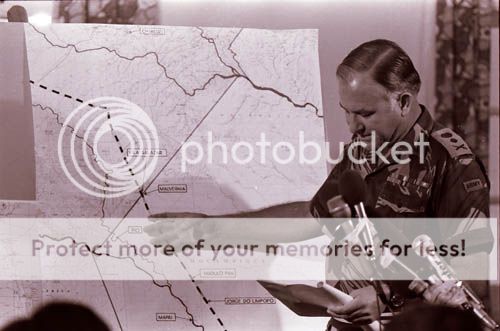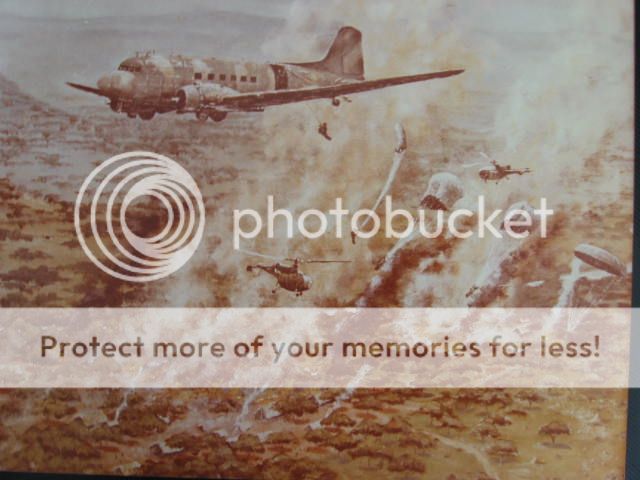Our man in the Ex-Rhodie community informed us of the death of General Walls.. Here's some information:
Lieutenant General George Peter Walls (1926/27 – July 20, 2010) served as the Commander of the Combined Operations Headquarters of the Military of Rhodesia, and later Zimbabwe, from 1977 until his retirement on 29 July 1980 during the Rhodesian Bush War.[2][3] In his latter years, he lived in exile in Eastern Cape, South Africa.[4]
Walls died on 20 July 2010 at George Airport in South Africa. He and his wife, Eunice, were about to travel Johannesburg to meet up with family for a stay in their time share in the Kruger National Park. It is reported that he collapsed as he was getting out of the car; immediate efforts to revive him failed.
Walls trained at the Royal Military Academy in Sandhurst, United Kingdom. He fought for the British in World War II. After the war he served in the Black Watch, but later resigned. He joined the Southern Rhodesia Army as a corporal and commanded Rhodesia's C Squadron of the Special Air Service, in Malaya during the Malayan Emergency. He became the commanding officer of the Rhodesian Light Infantry in November 1964. He then became the General Officer Commanding the Rhodesia Army in 1972. In 1977 he became the Commander of Combined Operations, the head of the Rhodesian Army.

In May 1977 Walls received reports of ZANLA forces massing in the city of Mapai in Gaza Province, Mozambique. Prime Minister Smith gave Walls permission to take out the base. Uric would be executed by 360 ground troops drawn from Rhodesian SAS and RLI and engineers-arguably the finest troops of their day. The superbly manned Rhodesian Air Force would deploy every available aircraft - 8 hunters, 12 Dakotas, 6 Canberras, 6 lynx and 28 helicopters - among these last were newly arrived Rhodesian AB 205 A cheetahs (hueys) along with a few South African crewed Pumas and Super Frelons on loan to the air force. (Note: something not generally known is that the South African Air Force allowed some of its aircrews to complete a tour of duty with the Rhodesians - a number of these brave men died fighting for Rhodesia with whose cause they had identified.) The OP Uric area was close to the South African border and the South Africans were of course interested. In fact OP Uric had the largest single South African involvement of the Rhodesian war.
Aerial surveillance was to be provided by a remarkable aircraft a Dakota named Warthog, so called because it bristled with antennae and radomes. This aircraft was fitted out with monitoring equipment mounted on a large board clipped to the fuselage. This provided UHF, VHF and HF coverage with F.M. and A.M. along with a sensor system capable of picking up any radar station/system which the enemy might use to guide missiles and the ability to identify enemy surveillance radar. Teleprinters were on board with remarkable facility of encrypting messages typed in clear automatically and immediately. Warthog carried an intelligence officer and four signallers all skilled in identifying the 'handwriting' of operators in Zambia and Mocambique. Unarmed and confined to intelligence gathering the Warthog was vital to cross border operations. Richard Wood's B2 notes are littered with Warthog intreps.

Also taking part would be the command dak a converted Dakota carrying the Commander of Combined Operations General Walls and Air Commodore Norman Walsh, Rhodesian Air Force Director General of Operations. The commanders would orbit the operational area at a distance and would control both ground forces and aircraft using a lynx for liaison. Politically, a successful operation would hopefully force Zanla to the negotiating table at the conference being set up at Lancaster House. Furthermore international out cry at the raid would not be as strident as before because, now in its Zimbabwe - Rhodesia transition, the country had a black Prime Minister and President.
it resulted in over 300 enemy dead for the loss of 15 of their own (the highest of the war) the Rhodesians, with their very high operational standards, did not regard it as a success. There was bitterness too, as for the first time the Rhodesians were unable to recover the bodies of their failed comrades; for the first time also the lightly armed Rhodesians were stopped in their tracks and forced to abandon their objective in the face of a more numerous and well dug in enemy who, for a time at least, displayed a fighting tenacity not encountered before. Despite being armed with anti-aircraft, guns and strela (soviet name for SA7 surface-to-air missile) the most effective enemy weapon proved to be the comparatively simple RPG7 (a rocket fired from a hand held launcher) which, in the event, was responsible for all the Rhodesian fatalities.
Walls said in September 1978 that there is "no single day of the year when we are not operating beyond our borders."
Upon coming to office Prime Minister Mugabe kept Walls as the head of the army and put him in charge of integrating ZIPRA, ZANLA, and the Rhodesian Army. While Western media outlets praised Mugabe's efforts at reconciliation with the white minority, tension soon developed.[1]
On 17 March 1980, after several unsuccessful assassination attempts Mugabe asked Walls, "Why are your men trying to kill me?" Walls replied, "If they were my men you would be dead."
BBC news interviewed Walls on 11 August 1980. He said that he had asked British Prime Minister Margaret Thatcher to annul the 1980 presidential election prior to the official announcement of the result on the grounds that Robert Mugabe, his rival candidate, used intimidation to win the election. Walls said Thatcher had not replied to his request. On 12 August British government officials denied that they had not responded, saying Antony Duff, Deputy Governor of Salisbury, told Walls on 3 March that Thatcher would not annul the election.[2]
Minister of Information Nathan Shamuyarira said the government would not be "held ransom by racial misfits" and told "all those Europeans who do not accept the new order to pack their bags." He also said that the government was considering "legal or administrative action" against Walls. Mugabe, returning from a visit with United States President Jimmy Carter in New York City, said, "One thing is quite clear—we are not going to have disloyal characters in our society." Walls returned to Zimbabwe after the interview, telling Peter Hawthorne of TIME magazine, "To stay away at this time would have appeared like an admission of guilt." Mugabe drafted legislation that would exile Walls from Zimbabwe for his life and Walls moved to South Africa
